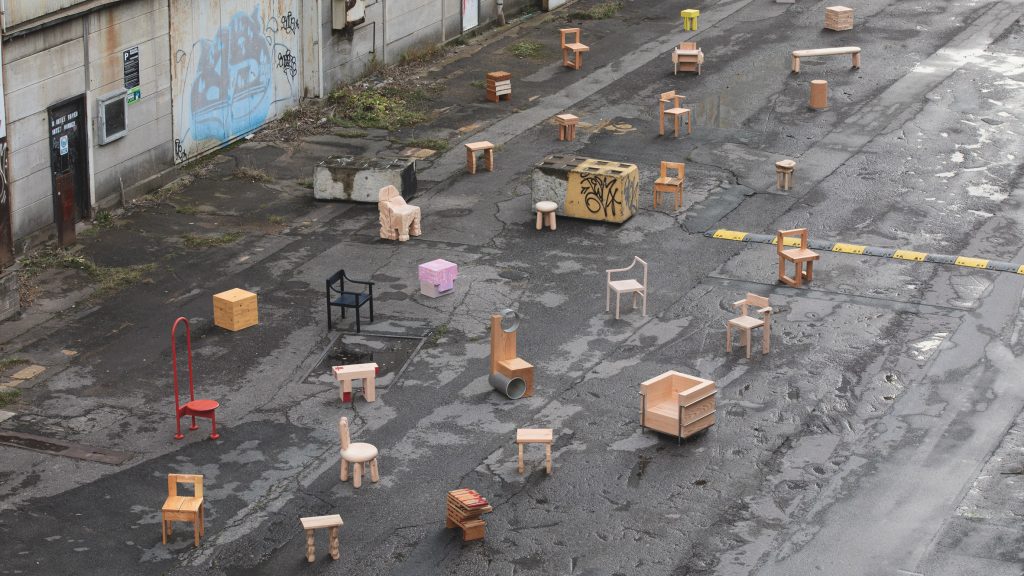[ad_1]
Danish studio Tableau and designer Ari Prasetya have filled the Connie-Connie cafe at the Copenhagen Contemporary art gallery with chairs created by 25 designers from leftover wood.
Tableau and Prasetya designed the cafe as a new addition to Copenhagen Contemporary, an international art centre in a former welding facility in the city’s Refshaløen area.
As the cafe is located within the gallery, Tableau, which created the overall spatial design for the 150-metre-square space, wanted to explore how furniture can also be art.
“We really wanted to showcase how furniture can become functional pieces of art and also how a spatial design can be dictated by a material and a direction involving multiple designers, artists and architects,” Tableau creative director Julius Værnes Iversen told Dezeen.
The studio worked with Australian designer Prasetya, who was in charge of the design and manufacturing of the bar as well as a number of other furniture pieces in the space.
They collaborated with 24 other creatives to create seating for the cafe. All the seats were made from leftover wood from Danish flooring brand Dinesen.
“We chose to work with Dinesen offcuts,” Iversen explained. “I have always been fascinated by the company and especially the quality of their material.”
“The offcuts are leftover material from their plank production, so we also made use of a material which has little usage normally,” he added.
Tableau aims to works with a large number of artists, designers and architects on its projects, as the studio believes that diversity in design and art produces the most interesting result.
For Connie-Connie, the only parameters the studio gave the designers was the size of each seat and the requirement that it should be comfortable.
“We curated the participants being very aware of which type of designer, artist or architect we wanted to take part,” Iversen said.
“So the finished result showcases quite well how we curate in Tableau in general. We like a large variety of directions.”
Prasetya, who created three of the chairs, said working with just leftover wood didn’t pose any difficulty.
“For me, it’s more dependent on the material choice, where you have many different ways to work with specific species of wood,” he told Dezeen.
“Obviously strength and construction is very important, so being aware of which part of the tree, grain direction all have to be considered.”
Prasetya’s three chairs for the space include the asymmetrical Genno and the more classic Armmi as well as Stine’s Desire, which he describes as a “phallic reflection and expression.”
“A play on size, scale, that demonstrates societies constant idea of ‘the bigger the better’, Stines chair was created through humorous banter about desire and a mention of the false perception of always wanting more,” Prasetya said.
The interior of the Connie-Connie cafe was painted in a green colour that contrasts against the clean natural wood colour on most of the seating and also nods to the furniture’s origins.
“To make a cohesive spatial design with an eclectic collection of furniture, we chose to colour all floors and walls in a monotone green color,” Iversen said.
“A color we found from the packaging of the Dinesen wood planks when visiting the production in the south of Denmark together with the artists,” he added.
“Normally their planks are delivered with this significant colored cover to protect it from rain and moist.”
All of the pieces at Connie-Connie will be sold either as singular originals or reproductions.
The creatives taking part in the project were alongside Tableau were Among Other Things, Anna Clarisse Holck Wæhrens, Anne Brandhøj, Arnaud Eubelen, Ari Prasetya, Bram Vanderbeke, Carsten In Der Elst, Davide Ronco, Frederik Gustav, Jacob Egeberg, Janis Karasevskis, Kevin Josias, Kim Lenschow, Kristine Mandsberg, Laurids Gallée, Mads Hilbert, Pablo Dorigo Sempere, Paul Cournet, Pettersen & Hein, Pil Whitta, Natalie P Koerner and Thomas Gayet.
Tableau has previously showcased Cornucopia, a collection of vases that the studio designed together with Röd Studio from steel and wool.
Other Danish design showcases include Ukurant, an exhibition of emerging Danish artists that took place during design festival 3 Days of Design.
The photography is by Michael Rygaard unless otherwise stated.
[ad_2]

